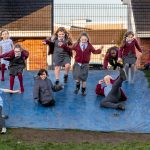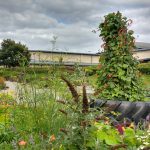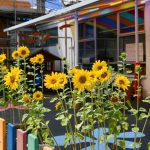Engaging children in multidisciplinary, evidence-based mental and physical health equity solutions
Engaging children in multidisciplinary, evidence-based mental and physical health equity solutions
In this workshop, presenters will describe how ongoing collaborations between institutions of higher education, community-based environmental non-profits, and students, parents, and staff at urban schools in Los Angeles have been able to overcome school district challenges and financial barriers to deliver schoolyard transformations that optimize student health and environmental outcomes.
Although school districts may have good intentions when committing resources to schoolyard greening projects, many of the projects are limited in scope due to maintenance concerns and many school district facility designers lack the expertise to create rejuvenating play spaces. As a result, little progress has been made to provide underrepresented students with the environments they need to thrive.
To solve these issues, we have created a process that relies heavily on the persistent engagement of multiple stakeholders through all stages of the project – from site identification to design concept planning to implementation to maintenance. The value of a multidisciplinary approach to schoolyard design will be emphasized throughout the workshop. In addition, various methods for assessing the quality of large-scale greening renovations will be explored.
A significant portion of the workshop will focus on how to elevate the child perspective using evidence-based observation and structured interview tools, methods that can be conducted by undergraduate and graduate students who, through participation in the work, become equity-focused and civically engaged citizens. Specific attention will be given to the assessment of child physical activity, social interactions, and mental health.
Workshop facilitators will present case study examples where these methods have informed schoolyard design. In these case studies, elementary school students have developed a sense of ownership of their schoolyards as well as agency to advocate for themselves and their environment. Examples of student-initiated and student-led maintenance strategies resulting from green schoolyard renovations will also be presented.
Audience members will leave the workshop with ideas for modifying traditional design practices and policies in order to prioritize student benefit.
About Marci Raney and Claire Latané
Marci and Claire are living schoolyard advocates and collaborators on multiple projects in the Los Angeles area.
Marci Raney, PhD, is an Associate Professor of Kinesiology at Occidental College in Los Angeles and President of the Southwest Chapter of the American College of Sports Medicine. She is a Certified Exercise Physiologist and Physical Activity and Public Health researcher. She has over a decade of experience collaborating with public health departments, school districts, hospitals, and non-profits to evaluate family-focused and school-based health promotion interventions. Most recently, she has leveraged her educational background, professional networks, and location to decrease income-based disparities in physical activity participation and wellbeing in urban Los Angeles through Living Schoolyard planning and evaluation efforts.
Claire Latané, MLA ASLA SITES AP, works on design for mental health and well-being, climate-appropriate design, and promoting equitable access to humane urban environments and nature. She founded and organizes the Emergency Schoolyard Design Volunteers for the National COVID-19 Outdoor Learning Initiative, led by Green Schoolyards America, The Lawrence Hall of Science, San Mateo County Office of Education, and Ten Strands. Her work developing design strategies to support mental health has been supported by the Landscape Architecture Foundation, the Association for Women in Architecture Foundation, Prevention Institute, and Cal Poly Pomona’s Department of Landscape Architecture. Her book Schools that Heal: Design with Mental Health in Mind will be published by Island Press in early 2021.









